ASUS P8Z77-V Deluxe Review - Know Your SKU
by Ian Cutress on May 12, 2012 8:45 AM EST- Posted in
- Motherboards
- Asus
- Z77
LAN Speed Test
LAN Speed Test is a freeware program designed for testing the network connection between two PCs on a home network. The speed of the transfer is limited by the lowest common denominator on the network, so if you have gigabit Ethernet capable computers but a 100 Mbit capable router, you are limited to 100 Mbit transfer. Note that this is really a formality – if a network port is rated at 1 Gbps, then chances are that it should hit at least 90+% of this value. The main test here is CPU usage, and how much is offloaded by the controller. For this test, we use LAN Speed Test to transfer 1000 x 1 MB files across a home network with a 1 Gbps lowest common speed to the same machine each time, in a read/write scenario.
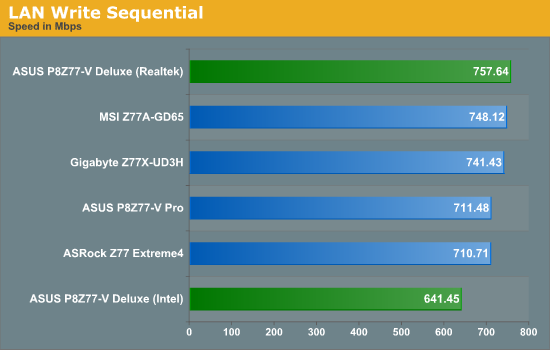
Due to a new slight variation in our LAN testing, the LAN Read numbers for our Z77 lineup are void - as soon as we can get time to test the previous boards, we will include the numbers back again. In terms of sequential write testing however, the Deluxe does well on the Realtek NIC.
USB Speed
For this benchmark, we run CrystalDiskMark to determine the ideal sequential read and write speeds for the USB port using our 240 GB OCZ Vertex3 SSD with a SATA 6 Gbps to USB 3.0 converter. Then we transfer a set size of files from the SSD to the USB drive using DiskBench, which monitors the time taken to transfer. The files transferred are a 1.52 GB set of 2867 files across 320 folders – 95% of these files are small typical website files, and the rest (90% of the size) are the videos used in the Sorenson Squeeze test.
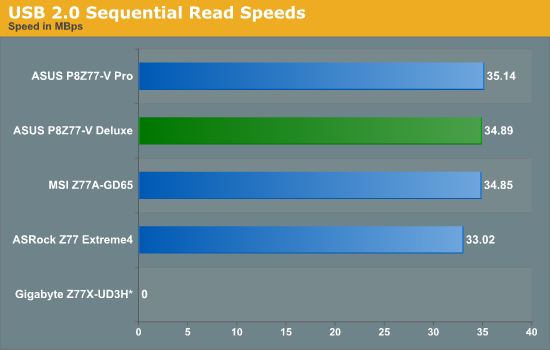
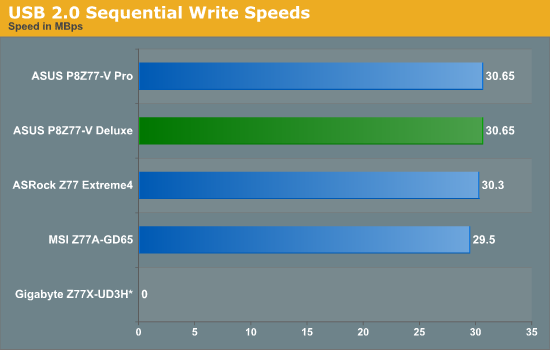
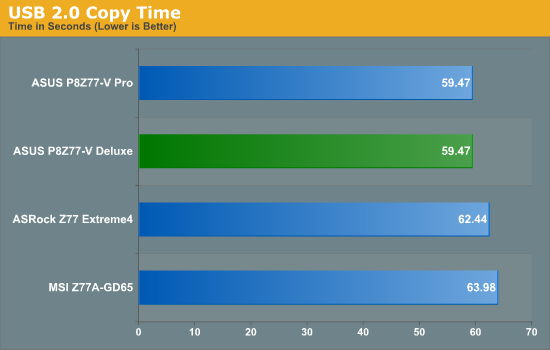
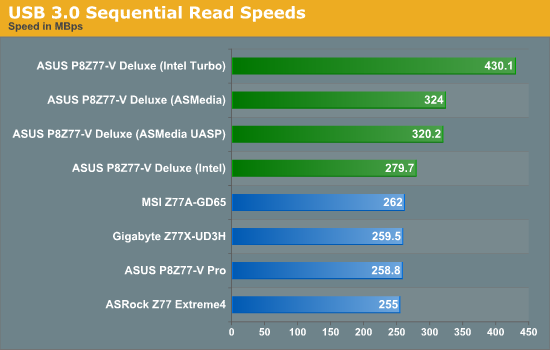
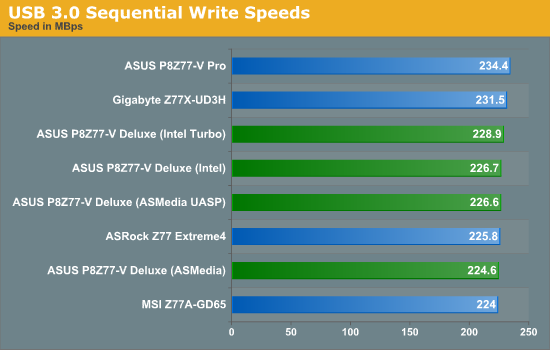
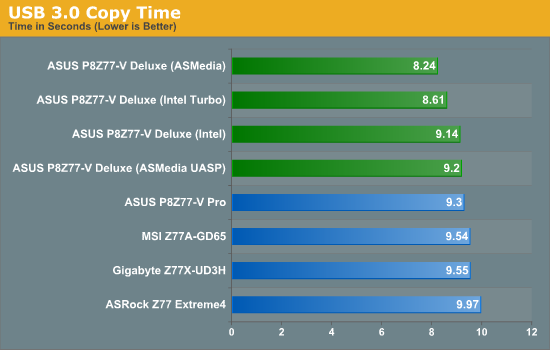
USB results, in particular the USB 3.0 results, are rather impressive - both the ASMedia and Intel controllers out perform the Intel controllers on other boards in our absolute copy test, and even more so when under USB 3.0 Boost modes.
SATA Testing
We also use CrystalDiskMark for SATA port testing on a C300 drive. The sequential test (incompressible data) is run at the 5 x 1000 MB level. This test probes the efficiency of the data delivery system between the chipset and the drive, or in the case of additional SATA ports provided by a third party controller, the efficiency between the controller, the chipset and the drive.
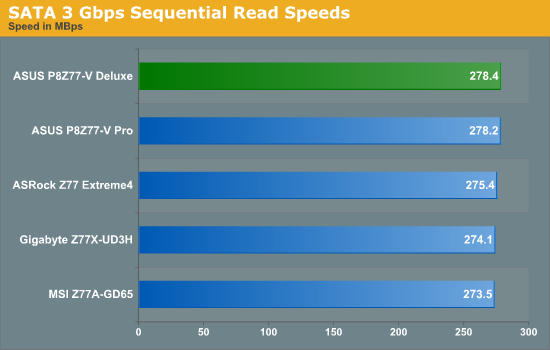
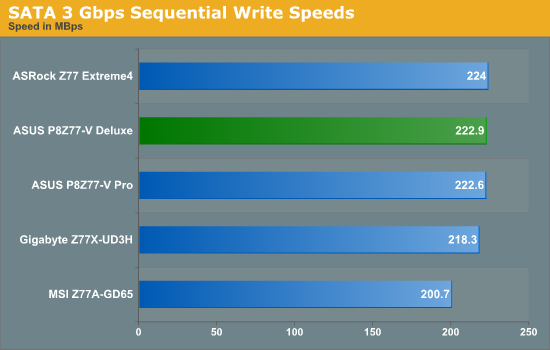
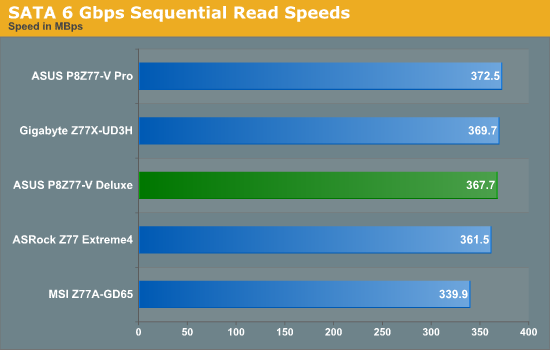
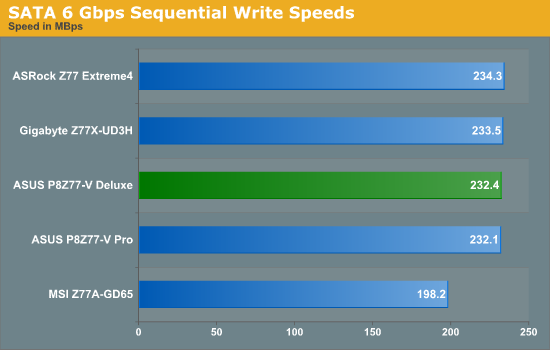
SATA testing on the Deluxe shows no abnormalities.
DPC Latency
Deferred Procedure Call latency is a way in which Windows handles interrupt servicing. In order to wait for a processor to acknowledge the request, the system will queue all interrupt requests by priority. Critical interrupts will be handled as soon as possible, whereas lesser priority requests, such as audio, will be further down the line. So if the audio device requires data, it will have to wait until the request is processed before the buffer is filled. If the device drivers of higher priority components in a system are poorly implemented, this can cause delays in request scheduling and process time, resulting in an empty audio buffer – this leads to characteristic audible pauses, pops and clicks. Having a bigger buffer and correctly implemented system drivers obviously helps in this regard. The DPC latency checker measures how much time is processing DPCs from driver invocation – the lower the value will result in better audio transfer at smaller buffer sizes. Results are measured in microseconds and taken as the peak latency while cycling through a series of short HD videos - under 500 microseconds usually gets the green light, but the lower the better.
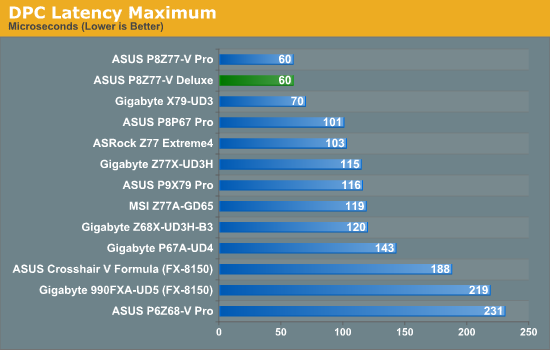
The agressive BIOS settings of the P8Z77-V Pro and Deluxe have helped both of them get the best ever results in our DPC Latency test.










52 Comments
View All Comments
Tcat - Saturday, September 15, 2012 - link
I'm building a system to last me a while and went with this MB, based on the excellent review.Where I blew it was buying a Kuler 920 radiator for this. I have to install the software first? How about getting Win 8 in first? Of course the CPU will go up in smoke before that happens.
Can anyone suggest a good fan that will fit this board and not be too loud?
TIA
Tcat
biswa60 - Saturday, October 19, 2019 - link
In the next notch up above the Pro in the channel board segregation, ASUS sells the Deluxe.https://certificate-template.com/
https://businessletter.org/